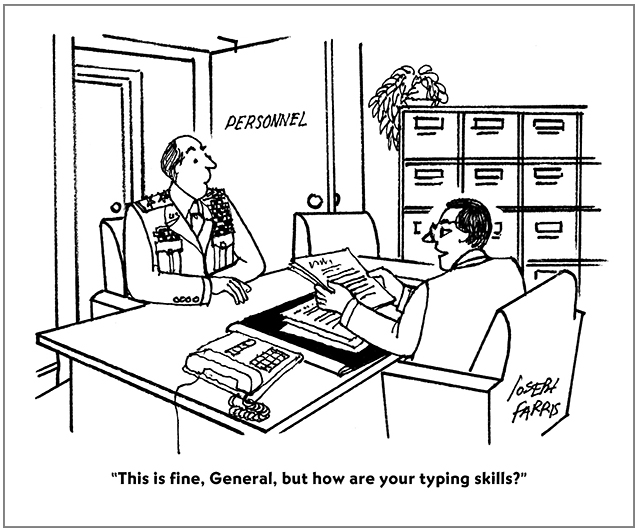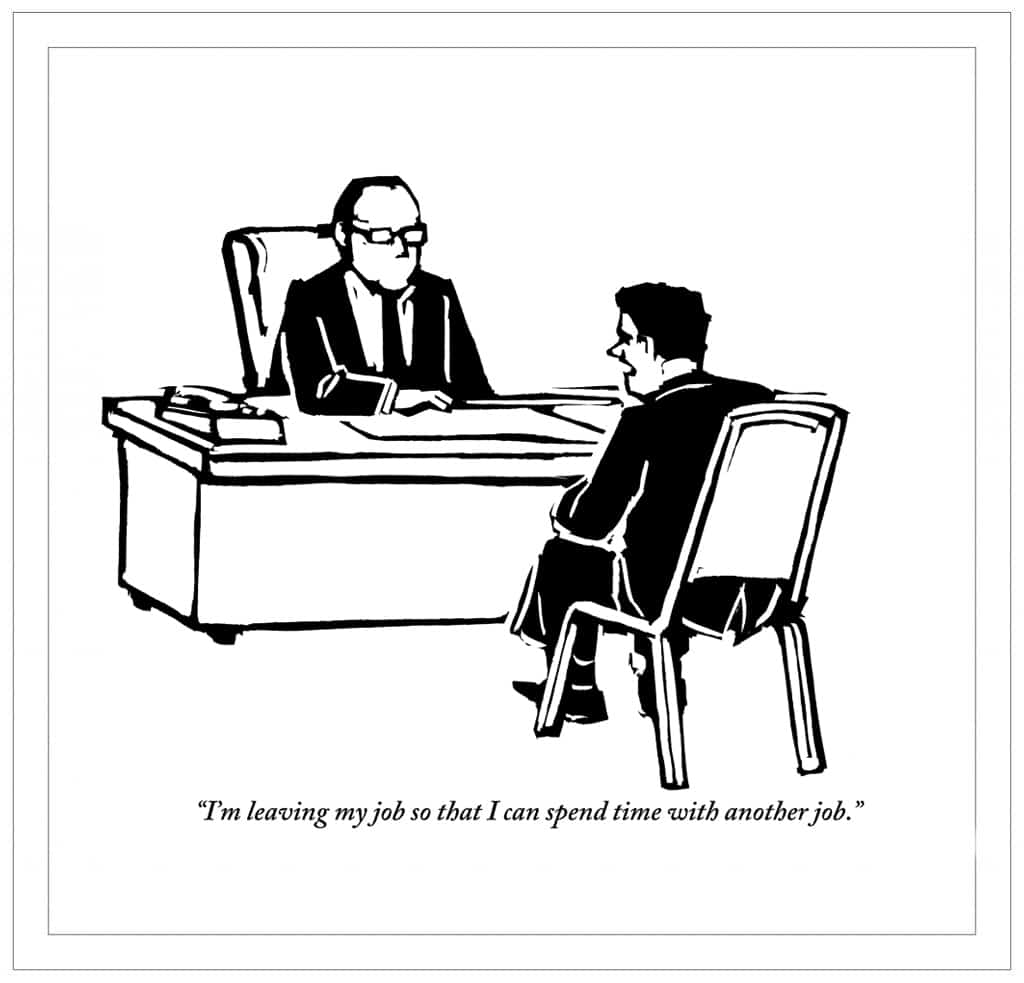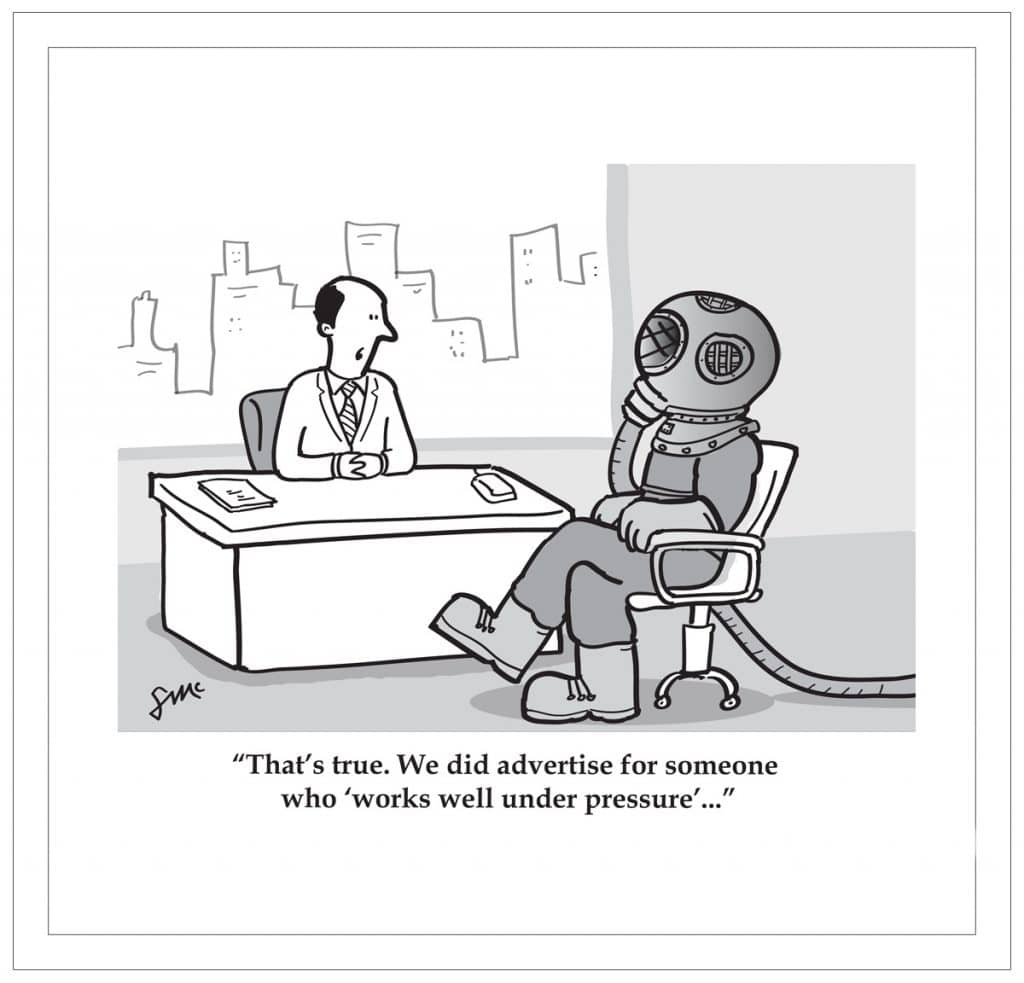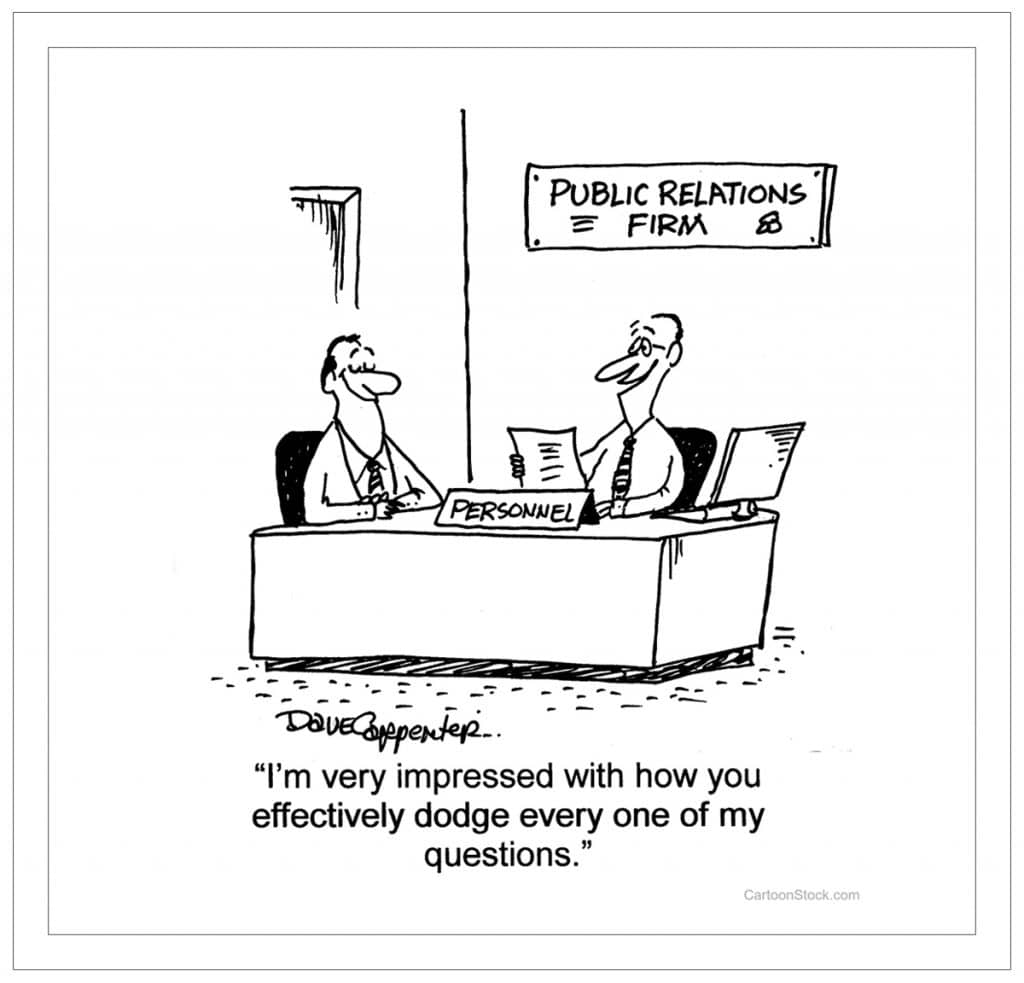Do you have an important job interview coming up? Are you nervous about it?
That’s perfectly understandable. Most people – even the most seasoned professionals – are unsettled by the idea of being placed into the spotlight and grilled by a zealous hiring manager.
Job interviews are intrinsically nerve-wracking due to their unpredictable nature.
Questions such as “tell me about yourself” don’t trigger much anxiety because they’re predictably common and relatively easy to prepare for; it’s the curveballs that stress people out.
Well, rejoice – today I’ll equip you with smart answers to tough curveball interview questions.
By the way, if you’d like to receive the highest level of support with job interview preparation, consider our premium job interview coaching services. We offer these remotely, to clients in Sydney, Melbourne, Adelaide, Brisbane, Canberra, Perth and beyond.
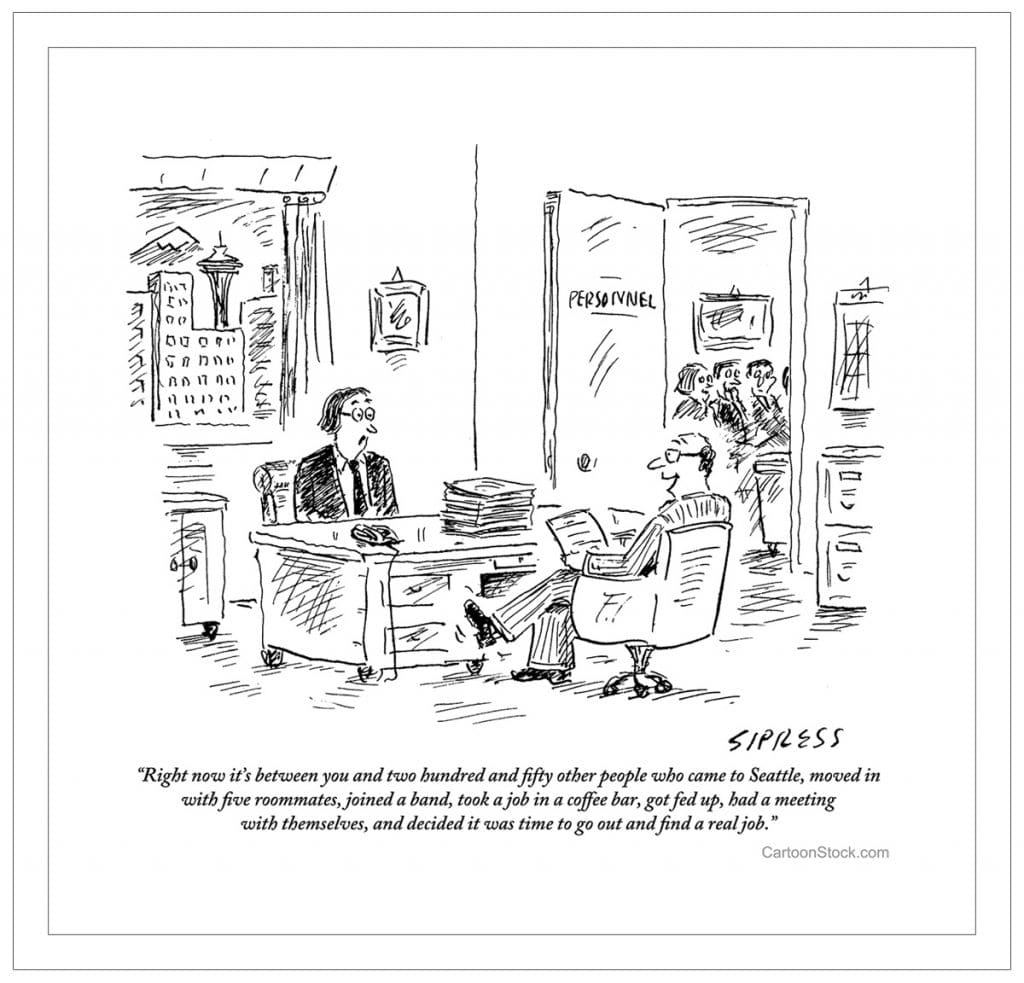
Just between you and me, I don’t believe that tough interview questions are very effective candidate screening tools; mostly, they serve no purpose other than making the interviewer feel smart. However, until more sophisticated candidate screening methods emerge in the near future, we’re stuck with what we have.
Your job is to learn to play this game well.
Before you start dissecting individual questions and their answers below, be sure to do the requisite background work. That means:
- Research the organisation to help you to understand the company and its challenges, values, and strategies.
- Review the job description and compare the requirements to your own career background to help you identify strengths (and skills gaps) with regards to the position.
Then – and only then – start learning to answer specific questions below.
1. Would You Be Willing To Take A Salary Cut?
What They Want To Know:
Salary is a very delicate topic. However, being able to negotiate money is a strength in itself – especially if you’re applying for management or sales roles. The key is answering this question well lays in your ability to read the motivations underneath the question.
It’s entirely possible that the business is being sneaky, and is trying to lure candidates by advertising a certain salary, then asking them to aim lower. Or, perhaps this is a test designed to see how you handle being pressed in a negotiating situation. Finally, this could be a legitimate “we want you, but can’t quite afford you” realisation on behalf of the employer.
Regardless, use this question as an opportunity to demonstrate your negotiation and conflict resolution skills. Start by reiterating your unique value, then offer options with a “can-do” attitude.
Example Of A Bad Answer:
“Yes.” or “No.”
Example Of A Good Answer:
“Thank you for being frank. I’d like to make a huge positive impact on your company and I believe I have the skills to do so. These include my 15 years in operations, as well as my MBA – and they do make me quite competitive within certain salary bracket in the market. While I have certain salary expectations, money isn’t everything – and I’d look at all factors – including intangibles such as the company’s culture – as part of the complete compensation package.”
2. Besides Compensation, What Do You Value The Most In The Workplace?
What They Want To Know:
Companies are increasingly focused on building teams that share the same values. As Kristi Hedges of HBR points out, culture determines how work gets done, but values enable the company to prioritise, make decisions and reconcile conflict. A culture may celebrate efficiency, for example, but values determine what gets sacrificed in the pursuit of it.
This question is designed to shed light on your value system – as well as your personal awareness of your values.
It’s an easy interview question to game – because it’s not difficult to research a company’s values online and provide an answer that demonstrates value alignment. However, I’d encourage you to think twice before doing so, as poor alignment of values is a strong predictor of job dissatisfaction. It’s best to aim for a legitimate alignment of values between you and your future employer.
Example Of A Bad Answer:
“Free craft beer and cider on tap, like they have at WeWork. A-ha-ha.”
Example Of A Good Answer:
“I’m the type of person who likes to be challenged. In fact, I’m most fulfilled when I finish my workday knowing I gave it 110%. Because of this, I’m looking for a workplace where I can have the opportunity to take on a lot of responsibility, be pushed outside of my comfort zone and drive results. I’m definitely not a “keeping a seat warm” type of manager.”
3. If You Could Choose Any Company To Work For, Where Would You Go?
What They Want To Know:
Never gush about other companies, but do acknowledge that you’d consider opportunities that are aligned with your values (see question above). The employer wants to hear that you’re passionate about their product and culture.
You should demonstrate this, but don’t feel the need to hide the fact that you’re considering other companies. Speculate on what else may have grabbed your attention, if this opportunity wasn’t on the table.
Example Of A Bad Answer:
“Tesla. Pretty cool company, right?”
Example Of A Good Answer:
“I applied for this position because I wanted to work for your company. I love what you’re doing in the market, and how you’re going about it, so the opportunity naturally stood out. Hypothetically speaking, if this opportunity didn’t present itself, I’d be looking at roles that I feel similarly aligned with. For example, I really love what XYZ company is doing in the ABC industry – I think it’s really important and interesting work”.
4. What Makes You Unique?
What They Want To Know:
What makes you different from other, similarly qualified candidates? How can you solve a commercial challenge in a way that other candidates can’t?
This is a tricky one – because most people are not aware of their differentiating factors. In fact, most candidates, when faced with this question, will default to summarising their experience.
The trick to focus on the intersections of your skills and personality, then back those up with tangible outcomes (read the full guide to answering this interview question here).
Example Of A Bad Answer:
“I have 10 years of experience in marketing.”
Example Of A Good Answer:
“I’m both creative and logical. Because of this, I’m able to design and implement marketing campaigns that are both creative and commercially meaningful. In other words, I focus on both creativity and ROI.”
5. What Type Of Work Environment Do You Prefer?
What They Want To Know:
This question probes for your alignment to company culture. It’s an important question to answer well for both the employer and for yourself – because 46% of new hires fail within the first 18 months and, in most cases, it’s due to company culture mismatch. Skills can be trained, but culture misalignment can be difficult to shift.
Use this question as an opportunity to discuss the company culture and your fit within it. If you don’t find enough common ground, this is probably not the right opportunity for you.
Example Of A Bad Answer:
“I want to work in a professional environment with nice people.” This answer, although technically correct (who doesn’t want to work in a professional setting full of nice people?) is too generic.
Example Of A Good Answer:
“I’m the kind of person who is driven by targets, so I need an environment that pushes me outside of my comfort zone. However, I’d also like to ensure that the company’s mission is personally meaningful to me. I applied for this role with Netflix because I think the traditional media landscape is broken and I’d like to play a part in shaking it up through the use of exciting emerging technologies.”
6. Are You Interviewing Anywhere Else?
What They Want To Know:
How hardball can we play with you? Don’t forget that it’s not just employees who compete for roles. Employers also compete for great talent – and your value, as perceived by them, is closely tied to your competitiveness in the market. Don’t reveal details of other companies or specific roles, but also don’t feel the need to hide the fact that you’re considering other opportunities.
Example Of A Bad Answer:
“No. You’re the only company that I want to work at” or “Oh yes, I’ve applied everywhere and now have 8 interviews lined up.”
Example Of A Good Answer:
“Look, I’d prefer to work at your organisation because of the strong culture alignment we spoke about earlier. However, recruiters are talking to me about a few other opportunities that are also closely aligned.”
7. Take A Few Minutes To Bring Your Resume To Life For Me.
What They Want To Know:
The interviewer wants to know what you bring to the table. Because this interview question is so open-ended, it can be easy to run away with your answer and even put your foot in your mouth. Don’t provide an “I’ve worked here”, “I’ve worked there” summary of your resume.
Rather, have a 3-minute elevator pitch prepared that starts by demonstrating your unique value and backs it up through a few data points from your resume. (How to prepare for your job interview).
Example Of A Bad Answer:
“When I finished university, I got a job at KPMG as a graduate analyst. It was a great job and I learned a lot. A few years later I applied for a job with Deloitte as a senior analyst. A friend of a friend knew the hiring manager and I got that job. It was a pretty good role – my boss was very nice and I worked there for a few years. Unfortunately, I was made redundant, which is why I’m interviewing with you today.”
Example Of A Good Answer:
“I’m knowing for helping organisations strip friction out of their sales processes. Industry-wise, my sweet spot is working in B2B technology sales environments. You’ll see from my resume that in a recent sales operations role with Cisco I was able to increase the effectiveness of a sales team by 26% in just three months by reducing their dependence on external stakeholders. Similarly, in a role that I held between 2012 and 2015, I exceeded…..”
8. Why Are There Some Gaps In Your Employment?
What They Want To Know:
Are you the type of person who jumps around and can’t commit to anything? Are you trying to cover something up? This tough interview question is destined to shed light on your employment trajectory, and the decisions that shaped it.
Be honest. Don’t lie – ever. When explaining a gap, emphasise the positives where you can (e.g., describe the reason for a gap, but demonstrate that the time between jobs was spent productively).
Example Of A Bad Answer:
“I was so tired of working, and I took a break,” or “I couldn’t find a job.”
Example Of A Good Answer:
“I took time off to care for a family member / had a period of unemployment following a layoff, but used that time to complete a course / upskill.”
9. What Do You Expect From A Boss?
What They Want To Know:
Your interviewer is interested in knowing whether you, as an employee, are coachable and have reasonable expectations of your future boss. Don’t fall into the trap of answering this question by listing what you disliked in your previous supervisors. Provide an honest example of the management style that is most likely to motivate you to do your best work.
Example Of A Bad Answer:
“Let me tell you a story about a previous boss of mine….. what a tool, right?”
Example Of A Good Answer:
“I find I thrive in situations where my supervisors take the time to provide me with constructive feedback about my performance. This allows me to know that I’m on the right track. I also appreciate it when they have an “open door” policy where their staff feel encouraged to approach them about issues.”
10. What Is Your Biggest Weakness That’s Really A Weakness, And Not A Secret Strength?
What They Want To Know:
“What are your weaknesses?” is a very common job interview question. Most candidates prepare for it by identifying a couple of “softball” weaknesses that are easily repackaged as strengths. This question puts a spanner in the works by forcing you to get more honest.
To provide an intelligent answer to this tough interview question, I suggest you begin by examining your personality using the Myers Briggs personality indicator. This tool is frequently used by executives to provide non-judgemental, factual insights into people’s personalities. For example, an INTP is very determined, but can be edgy in their style of communication.
.
Example Of A Bad Answer:
“I have no real weaknesses.”, “I’m unreliable.”
Example Of A Good Answer:
“Glad you’ve asked me about this. I’m the type of person who likes to constantly improve. As a result, I recently used the Myers Briggs test to identify my strengths and weaknesses. Turns out, I’m an ENTJ, which means I’m very effective but can be impatient. I expect my team members to prove themselves on the very first assignment. If they begin to underperform, my tendency is to stop delegating to them and start doing the task myself.”



